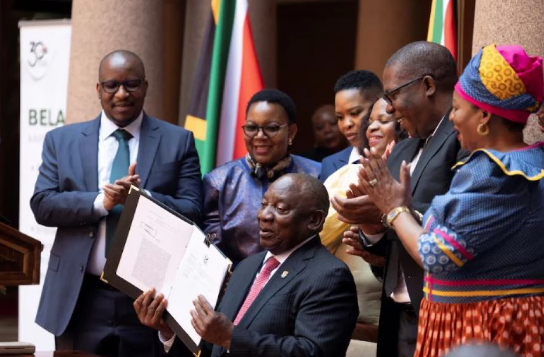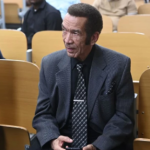South African President Cyril Ramaphosa defended the strength of his unity government on Friday following a dispute over a controversial education bill that exposed tensions between his ANC party and its main coalition partner, the Democratic Alliance (DA). Speaking to the media after signing the bill into law, which has angered the DA, Ramaphosa emphasized that despite ideological differences, the government of national unity (GNU) remains strong.
“We come from different histories and are driven by different ideological outlooks, but the government of national unity is durable,” Ramaphosa said, dismissing concerns about a potential collapse over disagreements. He added, “I have confidence in the durability of the GNU because anything else is just too ghastly to contemplate.”
The bill, which has stirred controversy, grants the education department the power to approve school boards’ language policies, aimed at preventing discrimination. The ANC argues that students are being excluded from certain schools based on the language they speak, which it claims is being used as a proxy for racial exclusion—implicitly referring to Afrikaans, the language of South Africa’s first white settlers, promoted under apartheid.
The DA, however, opposes the bill, claiming it infringes on South Africans’ right to learn and teach in their mother tongue. The party, which has struggled to shed its image as a representative of the white minority, many of whom speak Afrikaans, has vowed to challenge the bill in court.
Ramaphosa, in support of the legislation, stated that it would “resolve longstanding challenges in our education system.” But the DA criticized the bill as a violation of the principle of consensus-building within the government of national unity, with some members warning it could threaten the coalition.
Commenting on the issue, political professor Andre Duvenhage explained, “Primarily, it’s about the use of Afrikaans as a medium of instruction, which is seen as an attempt to exclude people who cannot speak Afrikaans.” He further noted, “In a way, the legislation is an attempt to open up these schools for all people.”
In addition to language policy changes, the Basic Education Laws Amendment (BELA) Bill mandates one year of pre-primary education, strengthens the ban on corporal punishment in schools, and regulates homeschooling.
Ramaphosa assured that there would be a three-month consultation period on the most controversial aspects of the bill. “If a solution is not reached, then implementation will proceed,” he stated.



